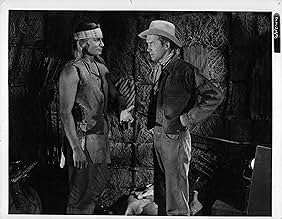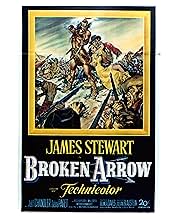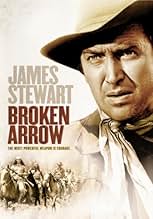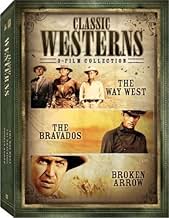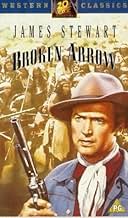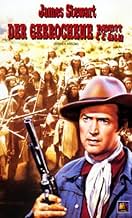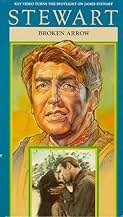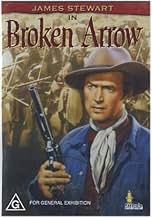IMDb RATING
7.1/10
10K
YOUR RATING
Tom Jeffords tries to make peace between settlers and Apaches in Arizona territory.Tom Jeffords tries to make peace between settlers and Apaches in Arizona territory.Tom Jeffords tries to make peace between settlers and Apaches in Arizona territory.
- Director
- Writers
- Stars
- Nominated for 3 Oscars
- 4 wins & 6 nominations total
Joyce Mackenzie
- Terry
- (as Joyce MacKenzie)
Robert Adler
- Lonergan - Stage Driver
- (uncredited)
Trevor Bardette
- Stage Passenger
- (uncredited)
Chris Willow Bird
- Nochalo
- (uncredited)
Raymond Bramley
- Col. Bernall
- (uncredited)
Chet Brandenburg
- Miner
- (uncredited)
Argentina Brunetti
- Nalikadeya - Cochise's Wife
- (uncredited)
Harry Carter
- Miner
- (uncredited)
Iron Eyes Cody
- Teese
- (uncredited)
J.W. Cody
- Pionsenay - Chosen Warrior
- (uncredited)
Heinie Conklin
- Townsman
- (uncredited)
Dolores Christine Cypert
- American Indian
- (uncredited)
- …
- Director
- Writers
- All cast & crew
- Production, box office & more at IMDbPro
Featured reviews
Excellent adaptation of Elliott Arnold's book "Blood Brother" concerning the talk, the need, and the struggle for peace between the white man and the Apache Indians in 1870 Arizona. James Stewart is very effective as a brave former Scout for the Union who used to kill Indians but who now wants the slaughters to stop; he learns their tongue, sends up a smoke signal, and is soon in conference with Cochise himself to allow the U.S. mail-riders safely through Apache terrain...he also finds love with Indian princess Debra Paget, a romance his racist white brothers obviously resent (and at least one Apache soldier as well). Strong, moving story relies on the complicated interpersonal relationships between the characters for its impact, and the performances from Stewart, Paget, and Oscar-nominated Jeff Chandler do not disappoint. Beautifully filmed on rugged locations, Delmer Daves directs a winner, one of the best westerns of its era. *** from ****
Tagline: Of this motion picture the screen can be proud... Today... Tomorrow... A generation from now...
Worth repeating this tagline, because after seeing the film again for the first time in 42 years, it's right on. 50s westerns almost universally depicted Indians as pigeon-English speaking savages... or tried to talk Indian that translated to pigeon-Indian.
While the leading cast is all-Anglo, the perspective is that both sides in the Wild West were had more than a few intelligent, caring individuals among them. A willingness to sacrifice much (including renegades) to achieve a lasting peace is the message.
Jimmy Stewart had something to lose by doing a picture like this, but the acting here stands with any in his career. The portrayal of Cochise by Jeff Chandler is powerful, although unquestionably a little bit too noble-savagish.
"Let's mosey on over there" is a line spoken by Stewart toward the end of the film. Takes you back to a time when people took time to mosey.
A good-hearted picture by a little-known director standing up against the prevailing stereotypes. Wouldn't be surprised if Costner watched it more than once before making "Dances with Wolves".
Worth repeating this tagline, because after seeing the film again for the first time in 42 years, it's right on. 50s westerns almost universally depicted Indians as pigeon-English speaking savages... or tried to talk Indian that translated to pigeon-Indian.
While the leading cast is all-Anglo, the perspective is that both sides in the Wild West were had more than a few intelligent, caring individuals among them. A willingness to sacrifice much (including renegades) to achieve a lasting peace is the message.
Jimmy Stewart had something to lose by doing a picture like this, but the acting here stands with any in his career. The portrayal of Cochise by Jeff Chandler is powerful, although unquestionably a little bit too noble-savagish.
"Let's mosey on over there" is a line spoken by Stewart toward the end of the film. Takes you back to a time when people took time to mosey.
A good-hearted picture by a little-known director standing up against the prevailing stereotypes. Wouldn't be surprised if Costner watched it more than once before making "Dances with Wolves".
While I have seen better westerns, I was really impressed with Broken Arrow. Not just because it is a very good film, but it is also different. While a lot of westerns deal with themes(some complex, some not so much)such as revenge and betrayal, Broken Arrow is a very poetic and elegiac film that you can see perfectly in how the story is constructed. Also the Indians here are portrayed as those in want of freedom with their families, which I found refreshing, seeing as I have seen them portrayed as quite brutal. Broken Arrow is a beautifully photographed film, the script flows nicely and is thought-provoking and the score is very stirring. The acting is fine, Debra Paget, breathtakingly-beautiful she is, and her scenes with Stewart are touching, is good but I couldn't help thinking they could have cast someone older. James Stewart is very believable in one of his better western performances, while Jeff Chandler gives the best performance of his career here and also the best performance of the movie too. All in all, excellent and very moving film. 8/10 Bethany Cox
In this underrated Western, Stewart is an ex-scout who tries to make peace between the Apaches and the white settlers in 1870s Arizona. For some reason this film's reputation has taken a hit over the years, but it is quite enjoyable. Stewart made several Westerns in the 1950s, starting with this and "Winchester 73" in 1950. Although the latter film is more highly regarded today, this film is actually better crafted, boasting fine cinematography and score. Chandler gives perhaps the best performance of his career as the noble Apache chief who is willing to make peace. Paget (looking like Britney Spears!) plays Stewart's love interest.
As the war rages between the American settlers and the Apache, former soldier Tom Jeffords happens upon a young Indian wounded after an attack. Taking upon himself to aid the boy, it's not long before the Apache show up intent on killing Jeffords by way of the war instincts. Pleading for Jeffords' life, the boy manages to get him spared by the Apache chief, Cochise. It's the start of a friendship that may just bring and end to the war and peace across the west.
Tho not the first "social" Western film made, Broken Arrow, it can be argued, is maybe one of the most important and telling genre films of the 50s. Showing humanist portrayals of the Apache and dealing out level headed tellings of the relationships between whites and the Native Americans, Delmer Daves' film is as relevant today as it was back on release. Adapted from Elliott Arnold's novel Blood Brother, the story follows Jeffords (a measured and fine James Stewart) as he attempts to broker peace between the warring factions. Firstly by convincing Cochise (Jeff Chandler bang on form) to allow the mail run thru the pass, something that brings suspicion and calls of Indian lover from Jeffords' own kind, and then to finally set up a peace pact at a time when violence and hatred was rife in the west.
As the friendship between the two men grows, Jeffords and an Apache girl fall in love (beautiful Debra Paget as Sonseeahray), thus giving the story a further jolt of momentum. The screenplay then really hits its stride, as Daves and his crew pit peace and inter racial love against a backdrop of bloodshed and savagery. Never glossing over just how hard peace is going to be, Broken Arrow retains intelligence and a sensitivity even as breakaway factions from both sides (for example we see Geronimo split the Apache and form a renegade front) are intent on killing off the peace process. It even has time for deep emotional kickers to reinforce the point of just how tough and unlikely peace and tolerance can be sometimes.
Broken Arrow was, and still is, a bold picture. In fact it can be argued that for the likes of Daves and Stewart, it was at the time very bold and risky career moves. But it paid off because the film stands up today as a picture of some distinction. It's themes and approach to its subjects are something that this generation, and all the future ones, will always find to be socially important. Boosted by Hugo Friedhofer's luscious score and taking advantage of the Lone Pine location shoot, Broken Arrow is a fine fine film that even non Western fans should be looking to absorb. 8/10
Tho not the first "social" Western film made, Broken Arrow, it can be argued, is maybe one of the most important and telling genre films of the 50s. Showing humanist portrayals of the Apache and dealing out level headed tellings of the relationships between whites and the Native Americans, Delmer Daves' film is as relevant today as it was back on release. Adapted from Elliott Arnold's novel Blood Brother, the story follows Jeffords (a measured and fine James Stewart) as he attempts to broker peace between the warring factions. Firstly by convincing Cochise (Jeff Chandler bang on form) to allow the mail run thru the pass, something that brings suspicion and calls of Indian lover from Jeffords' own kind, and then to finally set up a peace pact at a time when violence and hatred was rife in the west.
As the friendship between the two men grows, Jeffords and an Apache girl fall in love (beautiful Debra Paget as Sonseeahray), thus giving the story a further jolt of momentum. The screenplay then really hits its stride, as Daves and his crew pit peace and inter racial love against a backdrop of bloodshed and savagery. Never glossing over just how hard peace is going to be, Broken Arrow retains intelligence and a sensitivity even as breakaway factions from both sides (for example we see Geronimo split the Apache and form a renegade front) are intent on killing off the peace process. It even has time for deep emotional kickers to reinforce the point of just how tough and unlikely peace and tolerance can be sometimes.
Broken Arrow was, and still is, a bold picture. In fact it can be argued that for the likes of Daves and Stewart, it was at the time very bold and risky career moves. But it paid off because the film stands up today as a picture of some distinction. It's themes and approach to its subjects are something that this generation, and all the future ones, will always find to be socially important. Boosted by Hugo Friedhofer's luscious score and taking advantage of the Lone Pine location shoot, Broken Arrow is a fine fine film that even non Western fans should be looking to absorb. 8/10
Did you know
- TriviaAt 41, James Stewart was 26 years older than Debra Paget, who was still only 15 when filming began in early June 1949.
- GoofsWhen General Howard is beginning to pick himself off the ground after the Apache attack on the military wagon train, the first shot shows the ground to be mostly desert sand, with very little vegetation, but when the scene jumps to a long shot of the General getting up, the ground around him is almost entirely covered with green vegetation, showing scarcely any sand at all.
- ConnectionsFeatured in Family Classics: Family Classics: Broken Arrow (1963)
- How long is Broken Arrow?Powered by Alexa
Details
Box office
- Gross worldwide
- $10,145
- Runtime1 hour 33 minutes
- Aspect ratio
- 1.37 : 1
Contribute to this page
Suggest an edit or add missing content



